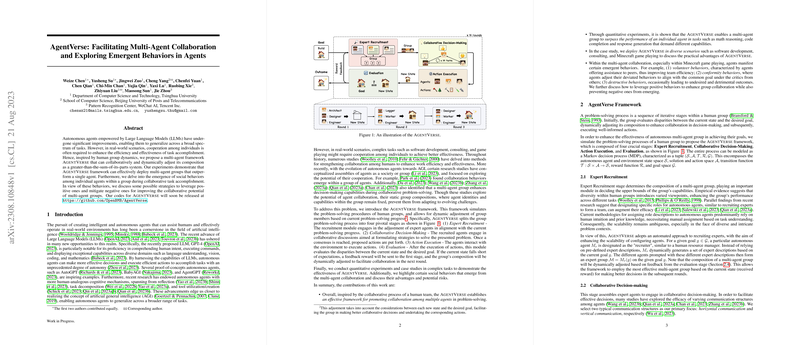Essay: An Overview of "AgentVerse: Facilitating Multi-Agent Collaboration and Exploring Emergent Behaviors"
The paper "AgentVerse: Facilitating Multi-Agent Collaboration and Exploring Emergent Behaviors" presents a framework designed to enhance the collaborative capabilities of autonomous agents in solving complex tasks. By leveraging the advancements in LLMs, especially those like GPT-3.5 and GPT-4, the authors propose a multi-agent system that mirrors human problem-solving processes through a structured, dynamic approach.
Framework Overview
AgentVerse divides the problem-solving process into four key stages: Expert Recruitment, Collaborative Decision-Making, Action Execution, and Evaluation. This structured approach optimizes the decision-making process within a multi-agent system, enabling agents to dynamically adjust roles based on task requirements and feedback from previous iterations.
- Expert Recruitment: The framework automates the selection of agents, who are assigned specific roles based on the ongoing task. This dynamic recruitment ensures that the agent group is versatile and capable of adapting to variable task complexities, improving scalability across diverse problems.
- Collaborative Decision-Making: AgentVerse employs both horizontal and vertical communication structures to facilitate decision-making. The horizontal structure allows for democratic discussions among agents, leading to a collective decision, whereas the vertical structure designates a solver who iteratively refines its decisions based on feedback from reviewers.
- Action Execution: Once decisions are made, agents execute the devised actions. This stage involves agents interacting with their environment to implement strategies developed in the decision-making phase.
- Evaluation: Feedback mechanisms provide insights into the effectiveness of current strategies. The system adjusts the composition and strategies of multi-agent groups, enhancing competence in subsequent iterations.
Experimental Validation
Experimental Results: The authors conduct extensive experiments across various domains, including text understanding, reasoning, coding, tool utilization, and embodied AI. The results consistently demonstrate that groups of agents orchestrated by AgentVerse outperform individual agents, particularly when using advanced LLMs like GPT-4.
Strong Numerical Results: In benchmarks such as Humaneval for coding, AgentVerse significantly improves Pass@1 metrics, showcasing its effectiveness in managing collaborative groups for complex tasks. The setup using the sophisticated communication structures illustrates a clear advantage in multi-agent configurations over simple single-agent systems.
Case Studies: Case studies on software development and consulting scenarios further illustrate the framework's practical implications. The collaborative processes within AgentVerse lead to more efficient and nuanced solutions than those achieved by solo agents.
Emergent Behaviors in Multi-Agent Systems
The paper explores emergent behaviors observed in embodied AI contexts, such as Minecraft. These behaviors—volunteer behaviors, conformity, and destructive behaviors—illustrate the potential and challenges of deploying multi-agent systems in real-world scenarios. While volunteer behaviors enhance collaboration, destructive behaviors pose safety challenges that necessitate further exploration in agent design and deployment.
Implications and Future Directions
Practical Implications: The ability of AgentVerse to dynamically adapt agent roles and facilitate efficient multi-agent collaboration has significant implications for complex, real-world applications. It paves the way for more sophisticated solutions in fields that require robust, autonomous decision-making systems.
Theoretical Implications: By examining emergent behaviors within agent groups, the paper contributes to the understanding of agent interactions and highlights the potential for unexpected, and sometimes undesirable, outcomes. These insights are crucial for the future development of ethical and safe AI systems.
Future Directions: Future research could focus on refining communication structures among agents, enhancing the robustness of agents against erroneous feedback, and exploring strategies to mitigate the risks associated with destructive behaviors. Such advancements may further improve the scalability and applicability of multi-agent systems in diverse contexts.
In conclusion, the paper presents a comprehensive and effective framework for facilitating collaboration among autonomous agents. By leveraging LLMs, AgentVerse demonstrates both improved task performance and insightful emergent behaviors, positioning it as a valuable contribution to the field of AI research.
